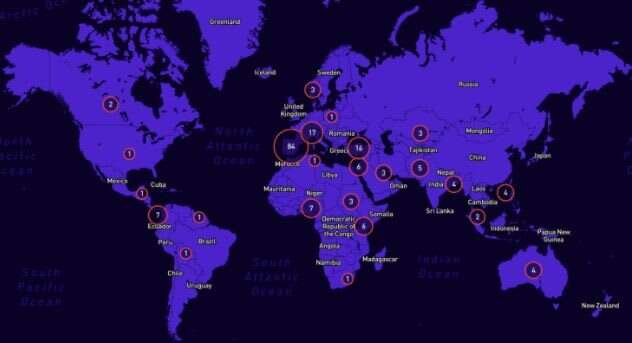The map produced as part of the ‘Mapping COVID volunteers’ experience and insights' project. Credit: Northumbria University
The experiences of volunteers from the international Red Cross and Red Crescent movement working through the COVID-19 pandemic have been mapped by a team including academics from Northumbria University.
The 'Mapping COVID volunteers' experience and insights' project gives a unique understanding of the response to Coronavirus by volunteers in different countries and the way the pandemic has impacted on their livelihoods, families and communities.
The interactive map was compiled by the International Federation of Red Cross and Red Crescent Societies (IFRC), with support from experts including academics from Northumbria University's Centre for International Development.
The project tells the stories of 200 Red Cross and Red Crescent volunteers from 44 different countries across North and South America, Europe, Asia, Africa and Australia, all of whom have been responding to the crisis in different ways.
The aim was to connect and unite the global Red Cross and Red Crescent volunteer network, to explore how the pandemic was rapidly changing ways of working, and to build on the momentum on the global collaboration and transformation within the Red Cross Red Crescent.
Volunteers were asked what they had learned from the Coronavirus Outbreak, what they had done in response that made them proud, the main challenges they had experienced as a volunteer, what they had seen for the first time because of Coronavirus, and how hope can arise from the Coronavirus response.
Professor Matt Baillie Smith, co-director of Northumbria's Centre for International Development, and postgraduate researcher Bianca Fadel carried out the initial analysis of the volunteers' stories to identify patterns and key themes in order to understand their experiences.
Explaining the findings, Bianca Fadel said: "We identified three different streams of sentiment, from an individual, community and global perspective. Globally the volunteers' stories reinforced a sense of belonging and common purpose, bringing people together. At a community level the feeling was that volunteers viewed the crisis as an opportunity, but also had concerns around existing and increased risks involved in volunteering. On an individual level we saw stories of everyday heroism and sacrifice by volunteers, but at the same time recognition of volunteers' fragility, needs and vulnerabilities, with many using volunteering as a way to cope during the crisis."
Professor Baillie Smith is a leading expert in researching the experiences of volunteers around the world. He has previously worked with the Swedish Red Cross to document the lived experiences of local volunteers working in areas affected by conflict. The 'Volunteers in Conflict and Emergencies' (ViCE) project gathered data from community-based volunteers working in Sudan, South Sudan, Ukraine, Honduras, Myanmar and Afghanistan to highlight their roles and experiences and challenges.
He is also leading the 'Refugee Youth Volunteering Uganda' (RYVU) project, exploring voluntary work by displaced young people in Uganda, and its impacts on skills, employability and inequality.
Explaining why the 'Mapping COVID volunteers' experience and insights' project is important he said: "Volunteers responding to COVID-19 are more than cheap service delivery. Their voices and experiences at community level are important now and looking ahead, and they often face similar challenges to those they are supporting. By listening to their stories and making their work visible we can influence policy-making processes that prioritize volunteers' safety, security and well-being in sustainable ways."
More information: Mapping COVID volunteers' experience and insights. future-rcrc.com/2020/07/22/map … rience-and-insights/
Provided by Northumbria University





















